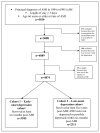Is early- and late-onset depression after acute myocardial infarction associated with long-term survival in older adults? A population-based study
- PMID: 16685310
- PMCID: PMC2560547
- DOI: 10.1016/s0828-282x(06)70263-x
Is early- and late-onset depression after acute myocardial infarction associated with long-term survival in older adults? A population-based study
Abstract
Background: Early-onset depression after acute myocardial infarction (AMI) affects short-term survival in clinical samples of patients. There is no information on the impact of early-onset depression or late-onset depression on long-term survival.
Objective: To investigate the impact of early- and late-onset depression on survival using administrative data.
Methods: A historical inception cohort design was used, commencing in 1994 with up to eight years of follow-up. A province-wide administrative data set from British Columbia was used to select the cohort and construct the variables. Data regarding hospitalizations, physician visits and prescription drugs were available. All individuals 66 years of age and older who had an AMI in 1994 or 1995 were selected (n=4874). Individuals were categorized as depressed, possibly depressed or not depressed based on physician or hospital visits indicating depression as a diagnosis and/or prescriptions for antidepressants. Early-onset depression was assessed during the first six months post-AMI, and late-onset depression was assessed between six months and five years post-AMI. All-cause mortality up to eight years post-AMI was the outcome.
Results: Both early- and late-onset depression were associated with long-term mortality. The hazard ratio was 1.34 (95% CI 1.04 to 1.73) for early-onset depression and 1.79 (95% CI 1.38 to 2.35) for late-onset depression.
Conclusions: Both early- and late-onset depression post-AMI were significantly associated with mortality up to eight years post-AMI. Depression is a strong independent predictor of post-AMI mortality in older adults.
HISTORIQUE: La dépression précoce après un infarctus aigu du myocarde (IAM) nuit à la survie à court terme au sein d’échantillons cliniques de patients. On ne possède pas d’information sur les répercussions de la dépression précoce sur la survie à long terme ou de la dépression tardive sur la survie.
OBJECTIF: Explorer les répercussions de la dépression précoce et de la dépression tardive sur la survie au moyen de données administratives.
MÉTHODOLOGIE: Une cohorte d’inception historique formée en 1994 a été utilisée Le suivi a duré jusqu’à huit ans. Un ensemble de données administratives brittano-colombiennes a été utilisé pour sélectionner la cohorte et définir les variables. Les données relatives à l’hospitalisation, aux consultations chez le médecin et aux médicaments sur ordonnance étaient disponibles. Tous les patients de 66 ans qui avaient souffert d’un IAM en 1994 ou en 1995 ont été sélectionnés (n=4874). Ils ont été classés comme dépressifs, peut-être dépressifs, ou non dépressifs selon le diagnostic de consultations chez le médecin ou à l’hôpital ou selon la prescription d’antidépresseurs. La dépression précoce était évaluée pendant les six premiers mois suivant l’IAM, tandis que la dépression tardive l’était de six mois à cinq ans après l’IAM. L’issue était un décès toutes causes confondues jusqu’à 8 ans après l’IAM.
RÉSULTATS: La dépression précoce et la dépression tardive s’associaient toutes deux à une mortalité à long terme. Le risque relatif s’élevait à 1,34 (95 IC 1,04 à 1,73) en cas de dépression précoce et à 1,79 (95 % IC 1,38 à 2,35) en cas de dépression tardive.
CONCLUSIONS: Tant la dépression précoce que la dépression tardive après un IAM étaient associées de manière significative à une mortalité jusqu’à sept ans après l’IAM. La dépression est un solide prédicteur indépendant de mortalité après un IAM chez les adultes âgés.
Figures
Similar articles
-
Long-Term Survival after Acute Myocardial Infarction in Lithuania during Transitional Period (1996-2015): Data from Population-Based Kaunas Ischemic Heart Disease Register.Medicina (Kaunas). 2019 Jul 9;55(7):357. doi: 10.3390/medicina55070357. Medicina (Kaunas). 2019. PMID: 31324034 Free PMC article.
-
Characteristics and Long-Term Prognosis of Holocaust Survivors Presenting with Acute Myocardial Infarction.Isr Med Assoc J. 2016 May;18(5):252-6. Isr Med Assoc J. 2016. PMID: 27430078
-
Long-term survival in patients with acute myocardial infarction and out-of-hospital cardiac arrest: A prospective cohort study.Resuscitation. 2018 Jan;122:41-47. doi: 10.1016/j.resuscitation.2017.11.047. Epub 2017 Nov 17. Resuscitation. 2018. PMID: 29155294
-
Depression, stroke, and dementia in patients with myocardial infarction.Dan Med J. 2018 Apr;65(4):B5423. Dan Med J. 2018. PMID: 29619929 Review.
-
Factors associated with return to work after acute myocardial infarction: A systematic review and meta-analysis.Work. 2024;79(3):1011-1025. doi: 10.3233/WOR-230301. Work. 2024. PMID: 38788106 Free PMC article.
Cited by
-
Prevalence of antidepressant prescription or use in patients with acute coronary syndrome: a systematic review.PLoS One. 2011;6(11):e27671. doi: 10.1371/journal.pone.0027671. Epub 2011 Nov 22. PLoS One. 2011. PMID: 22132126 Free PMC article.
-
Sex differences in long-term mortality among acute myocardial infarction patients: Results from the ISAR-RISK and ART studies.PLoS One. 2017 Oct 20;12(10):e0186783. doi: 10.1371/journal.pone.0186783. eCollection 2017. PLoS One. 2017. PMID: 29053758 Free PMC article.
-
AAFP guideline for the detection and management of post-myocardial infarction depression.Ann Fam Med. 2009 Jan-Feb;7(1):71-9. doi: 10.1370/afm.918. Ann Fam Med. 2009. PMID: 19139452 Free PMC article. Review. No abstract available.
-
Higher burden of depression among older women: the effect of onset, persistence, and mortality over time.Arch Gen Psychiatry. 2008 Feb;65(2):172-8. doi: 10.1001/archgenpsychiatry.2007.17. Arch Gen Psychiatry. 2008. PMID: 18250255 Free PMC article.
References
-
- Frasure-Smith N, Lesperance F, Juneau M, Talajic M, Bourassa MG. Gender, depression, and one-year prognosis after myocardial infarction. Psychosom Med. 1999;61:26–37. - PubMed
-
- Frasure-Smith N, Lesperance F, Gravel G, et al. Social support, depression, and mortality during the first year after myocardial infarction. Circulation. 2000;101:1919–24. - PubMed
-
- Frasure-Smith N, Lesperance F, Talajic M. Depression following myocardial infarction. Impact on 6-month survival. JAMA. 1993;270:1819–25. (Erratum in 1994;271:1082) - PubMed
-
- Frasure-Smith N, Lesperance F, Talajic M. Depression and 18-month prognosis after myocardial infarction. Circulation. 1995;91:999–1005. (Erratum in 1998;97:708) - PubMed
-
- Welin C, Lappas G, Wilhelmsen L. Independent importance of psychosocial factors for prognosis after myocardial infarction. J Intern Med. 2000;247:629–39. - PubMed
Publication types
MeSH terms
LinkOut - more resources
Full Text Sources
Medical




